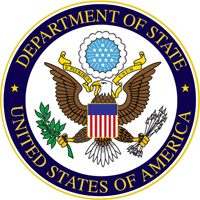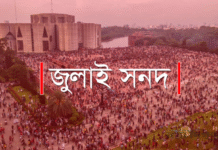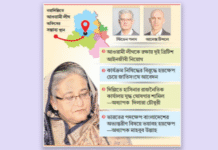The second war crimes tribunal of Bangladesh has found former Muslim League leader and BNP minister Abdul Alim guilty of nine of the 17 charges levelled against him.
The charges include genocide and murder committed during the Liberation War.
Apart from those, he was also found involved in five killings and in an incident of deportation, loot and arson.
Headed by Justice Obaidul Hassan, the ICT-2 started delivering its verdict in the war crimes case on Wednesday morning.
Alim was held ‘liable’ for deportation as described in the first of the charges.
He has been found guilty of genocide in charges 2,8, and 10.
Charge number 6, 7, 9, 12, and 14 – pertaining to killing — has been proven against the former BNP minister.
However, the tribunal failed to prove charge number 3, 11, 13, 15, 16, and 17 beyond reasonable doubt, the tribunal observed.
Charge 1
Alim, as a local Razakar leader and the Chairman of local peace committee raided and attacked the house of Meher Uddin Chowdhury at ‘Dom Doma’ in Joypurhat’s Panch Bibi with the Pakistan army and members of the peace committee on Apr 20 around 05:00pm during the 1971 Liberation War. They looted and set the house on fire, compelling Meher Uddin and his family to flee.
He has been charged with participating and substantially abetting the actual commission of offence of ‘deportation’.
Charge 02
On Apr 26, 1971 between 09am and 05pm, Alim along with Pakistani army Major Afzal and his troops, accompanied by members of the peace committee , attacked Hindu populated localities of Koroi, Kadipur, Chawkpara, Sonarpara, Palpara, Monshipara. Their houses were looted and set on fire and many were apprehended.
A total of 370 Hindus were shot dead there. One 90-year-old Kanchira Mohan was slaughtered and one Aswini Kumar Debnath was buried alive.
Genocide charge has been levelled against Alim for the large scale killing of Hindus.
Charge 03
On Jun 18, 1971 between 02pm and 09pm one ‘Reaz’, ‘Mridha’, member of the peace committee and 11 Pakistani army soldiers apprehended over 500 civilians and brought them to the courtyard of one Afaz’s house on orders of Alim, who had provided the list. 28 of those civilians were identified as pro-liberation and pro-Awami League and segregated, while the rest were allowed to go. They were brought inside a mud hut where 22 were killed but the rest somehow escaped.
Alim has been charged with murder.
Charge 04
In May, 1971 following Alim’s order and instigation, his accomplices belonging to peace committee and Razakar along with Pakistan army went to ‘Bakul Tola’ rail line. They split into groups and attacked the civilian population and looted the houses of Koktara, Ghorapa, Bagjana, Kutahara villages. They killed 19 pro-liberation civilians.
He has been charged with killing over the incident.
Charge 05
Between May 09 and 15, following Alim’s order and instigation, peace committee and Razakars along with Pakistani army went to Pahu Nanda and Pagla Dewan villages. They got a bunker dug by the locals and buried dead bodies of 67 Hindus, out of whom seven were killed in front of the villagers.
Murder charge has been brought over the incident.
Charge 06
In the first part of May, 1971, Razakar and peace committee members apprehended Abdus Salam and nine others while they were on way to India. They were handed over to Pakistani army on Alim’s order. Nine of them were killed at Bakul Tala of Koktara village and one Mofazzal managed to escape.
He has been charged with murder.
Charge 07
On May 26, 1971, in between 11am and 06pm, members of peace committee and Razakar along with Pakistani army attacked Nowda village and apprehended Ilias Uddin Sarder, Yusuf Uddin Sarder, Younusddin Sarder and Abdul Kader Mondol and brought them to Balighata UP. They were killed by the side of a pond of one Kali Saha.
The former minister has been charged with murder over the incident.
Charge 08
In the last part of May during the Liberation War, Alim, accompanied by Pakistani army Major Afzal and peace committee and Razakars went to Uttarhat Shahor. He told a meeting attended by 500/700 people, “The Hindus would not be forgiven,” and encouraged loot of whatever they (Hindus) had.
At the end of May, ‘Hindu Palli’, ‘Uttarhat Shahor’, ‘Harunjahat’ and surrounding areas were attacked and looted. Ten Hindus were apprehended and brought to the office of the peace committee located at the ‘gadi Ghar’ where they were killed at a place Khanjanpur Kuthibari Ghat as per Alim’s order.
Alim has been charged with genocide for the killing of the Hindus.
Charge 09
On Jun 14, 1971 peace committee members apprehended 15 youths suspecting them to be ‘freedom fighters’ while they were on the way to Bogra. They were brought to the office of the peace committee at ‘Gadi Ghar’. Alim ordered the killing of the youths after consulting Pakistani army Major Afzal. The youths were taken to ‘West Amatra’ where they were tortured to death. They were buried in a mass grave.
Murder charge has been levelled against the BNP leader over the incident.
Charge 10
In the last part of June, from the peace committee’s ‘Gadi Ghar’ office at Shownlal Bajla, Alim decided to kill 26 detained suspected freedom fighters. They were brought to the western open site of Joypurhat Railway Station by a truck. Keeping some arms of their own in front of the detainees, the Pakistani army, members of peace committee and Razakar including Alim and Major Afzal stood behind them. Motasim Billah, owner of ‘Alokhela Studio’ took photograph. Alim later collected photograph including the negative from the studio owner, although Motasim Billah kept some copies of photograph with him.
The detainees were taken to Joypurhat College and were killed.
Alim has been charged with genocide for the killings.
Charge 11
In between Jun 25 and 30 in 1971, Alim’s accomplices with Pakistani army apprehended 26 people including several bullock-cart pullers. They were shot dead near the ‘khanjanpur Kuthibari Bridge’ and their dead bodies were thrown into the river.
The prosecution has brought murder charge over the incident.
Charge 12
On Jul 24, 1971 Alim ordered detentionm of locally significant Awami League leader Dr Abul Kashem of ‘Devipur Kajipara’. He was confined throughout the night at ‘Teghor Bridge Razakar Camp’. He was brought to the ‘Gadi Ghar’ the following day. On Jul 26, Kashem was brought near the ‘Khanjanpur Kuthibari bridge’ from the peace committee office and was killed.
Alim has been charged with murder over the killing.
Charge 13
In the first week of September, during the Liberation War, 11 youngmen were brought by the Pakistani troops in trucks to the government degree college on Alim’s provocation. They were lined up at the place adjacent to ‘Baraghati’ and shot dead.
Charge of murder has been levelled against Alim over the incident.
Charge 14
On Oct 7, 1971 members of local peace committee, Rajakers and Pakistani army, apprehended three men including freedom fighter Fazlul Karim and took them in front of Joypurhat CO Office. As per Alim’s order and in his presence, faces of the detainees were painted and they were moved around the town on truck. Then they were taken to ‘khanjan pur kuthibari ghat’ where they were shot dead.
Alim has been charged with murder for the offence.
Charge 15
On Aug 25, Panchbibi’s Solaiman Ali Fakir and his two friends — Abdus Samad Mandal and Umar Ali — were handed over to the Pakistan army. They were tortured as per Alim’s directives. In the army camp set up inside the Joypurhat sugar mill, 25 civilians were held. Alim and a Pakistani Colonel set up a ‘court’ in the sugar mill and had sentenced the detainees to death. They were killed over eight nights.
Murder charge has been levelled against him over the incident.
Charge 16
During the Liberation War, 25 people including Solaiman Ali Fakir, Abdul Khalek, Abdus Samad and Aftab Hossain of Pachbibi were detained from Oct 25 in the Joypurhat sugar mill. On the ninth day of their confinement, a ‘court’ was set up where a Pakistani Colonel was the ‘judge’. Alim told the Colonel that they would flee to India if they were set at large and it would be damaging if they reported it there. However, four of them fled to India when they were released.
Confinement charge has been brought against him.
Charge 17
At the end of November, Subeder Major Jabbal Hossain of 17 wing, EPR took shelter at the house of one Nazim Uddin of Dhuroil with serious injuries. On the day of the Eid-ul-Fitr in 1971, razakars and Pakistan army, led by Alim, attacked the house of late Nazim Uddin and apprehended Jabbal Hossain and brought him to Joypurhat. Eventually the relatives of Jabbal Hossain came to know that he had been killed.
The prosecution had originally pressed 28 counts of charges against him. It could not produce any witnesses in charges four and five.
Alim’s trial had begun on July 9, 2012 during which 35 witnesses deposed against him. On the other hand, the defence presented three witnesses. They are Alim’s son Sazzad, Md Mamunur Rashid Chowdhury and Md Mozaffar Hossain of Joypurhat.
Source: Bd news24










